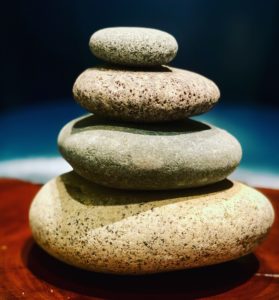Hugh Ross is an astrophysicist and a Christian apologist. He makes the point that there are two great books that legitimize Christian belief – the book of the Bible and the book of nature – the book of creation and the book of revelation. God makes himself known through the Bible and through the beauty of what he has made.
In my last blog, I addressed how the Bible can be a skinny place. Here I want to write about finding God in nature. Not surprisingly, many people actually find it easy to affirm this as a legitimate spiritual pathway. In fact, there are probably more than a few that would say, “It is easier for me to experience God by taking a walk in the woods than it is to experience him in a building on Sunday morning.” King David, the writer of many of the Psalms, gives words to that experience.
God’s glory is on tour in the skies,
God-craft on exhibit across the horizon.
Madame Day holds classes every morning,
Professor Night lectures each evening.
Their words aren’t heard,
their voices aren’t recorded,
But their silence fills the earth:
unspoken truth is spoken everywhere.
Psalm 19:1-4
Given that many already find this an easily accessible skinny place, you might be wondering why it needs to be addressed at all. Glad you asked! What merits our consideration isn’t what but how. I think we’d all agree on the what – we can all imagine (at some level) that nature is a common connecting point for many people. The question is how is it uniquely Christian pathway to experiencing God? In answering that I want to look at two sides of the spectrum:
Too much – Too little
Perhaps this sounds elementary. But, have you stopped to think about how many things in life are defined by this little too much/too little dynamic? Anybody who uses cream in their coffee understands this dilemma. You are sitting at a restaurant, you have finished your meal, and you get your coffee sorted out exactly like you want it (you take a couple sips) – and the server comes by with the coffee pot and fills up your cup. You had exactly the right amount of cream, and not you have to go through the whole routine again. They mean well, but do they understand what a delicate balance this is?
Think about something as simple as our sleep cycle. Too much sleep – we feel sluggish. Not enough sleep – we feel sluggish. The same dynamic is in play when we talk about experiencing God in nature. It is about navigating the same too much/too little continuum. If nature is going to grow into a skinny place it’s about not making too much of it AND not making too little of it.
Too Much
One thing I have never seen happen is that some one look at a beautiful sunset and say, “Now, that’s ugly! Can’t stand looking at that!” Never happens. No one denies the beauty of creation – when creation is at its best.
The challenge is actually on the other side of the equation. It’s easy to imagine people being so impressed that they end up worshipping the sun, the moon, and stars. History plays that out, where civilizations created religions around the elements of nature. One of the ways that philosophers and theologians have characterized this belief is animism, which in its most basic form is the belief that everything is conscious or that everything has a soul. So, instead of nature being a reflection of God’s glory (directing our attention to him), the objects of nature (themselves) are worthy of our worship. Paul, in his letter to the Romans, warns against this when he writes,
They traded the truth about God for a lie. So they worshiped and served the things God created instead of the Creator himself, who is worthy of eternal praise!
Romans 1:25
At first glance, we might wonder if this is really an issue in our day. Do people really do that kind of thing anymore? Isn’t this more of a primitive thing? Well, yes, it was probably more prominent in a more primitive culture, but I think animism is still very much alive.
When you visit some of the eco-terrorism websites and cycle through their justifications for why they do what they do, they read like an animistic manifesto. The reason we need to be alert to this, is because it’s easy to get deceived into believing that this is somehow Christian. Who can’t support the idea of taking care of creation – isn’t this what God asks us to do? Yes, and we will address that momentarily. However, there is a subtle (but all-important) difference between seeing nature as the object of our worship and/or seeing nature as window that leads us to the worship of the one true God. This is part of Paul had in mind, when he wrote,
I tell you this so that no one may deceive you by fine-sounding arguments.
Colossians 2:4
So, as beautiful and glorious as nature is – it is possible to make too much of it. We want to avoid that extreme. Going here will not lead us to a skinny place, but rather to a place of delusion and disappointment. That said, I believe the more common dilemma is on the other end of the spectrum, where we make too little of it.
Too little
On this side, we are typically at risk of three things – negligence, minimization, and guilt
- Negligence – early in the book of Genesis (after the creation narrative), God gives humanity a very specific assignment.
The Lord God took the man and put him in the Garden of Eden to work it and take care of it.
Genesis 2:15
This is one of the most basic things we are called to do. God placed us on the earth to, “be fruitful” and “care for the earth” – it doesn’t get any more basic than that. Sometimes we wrestle with the esoteric questions of: What does God want me to do with my life? and we can act as though we have no idea what that involves. Clearly, at some basic level, it’s about family and earth care. We do know that much.
This matters, because in the Christian community, we talk often about the family piece. But, unfortunately, we are not as aware or articulate on the earth care piece. In fact, in some ways we shy away from even mentioning it, because we don’t want to be accused of being “New Age-ish” But, this is Bible 101. It’s foundational. It’s also personal.
Sometimes we get side-tracked by philosophic arguments of climate change and corporate pollution. In so doing we can remove ourselves from personal responsibility, because there is nothing we can do about that stuff. However, it does boil down to choices we make every day of our lives that reflect our awareness of the importance of earth care.
- Recycling
- Picking up trash
- Purchasing eco-friendly products
- Supporting causes that reflect these values
Let’s not be neglectful of this assignment!
- Minimization – we are also at risk of making “too little” of this by missing opportunities to take advantage of it. We can intellectually appreciate the value of a walk in the woods or a hike up a mountain or getting our hands dirty in the garden. We see the benefit of it. We believe it would be good for us. But, it’s also true that we rarely give ourselves permission to enjoy it. It just doesn’t show up in our schedule.
This is how it typically works for me (perhaps you can identify). I know I would be helped by a fresh walk outside in the middle of the day or first thing in the morning, or with my wife after dinner. But I have a lot to get done. I don’t think I have time for it – even though just 20 minutes would be a great break – I don’t do it, because it feels frivolous. It feels unproductive. So, I promise myself I will do it over the weekend, but then it’s raining, or too hot, or there are other chores to do.
Is it possible that our souls are shriveling up, because we don’t think we have the time to find a “skinny place” in nature? We have work to do! In the 1930’s Allen Morgenstern, an industrial engineer and the creator of work simplification coined the phrase,
Work smarter not harder…
~Allen Morgenstern
Even though we have had that phrase before us for almost a century, I wonder if we really believe it, because if we did, wouldn’t we gladly and enthusiastically make a walk in the woods as important as putting a few extra hours of overtime? And maybe that really gets us to the core of the issue. The reason we make too little of it, is because we feel too dang guilty when we do it.
- Guilt – it really strikes me as odd (although I absolutely get it). In most churches there is a ‘approved way’ for us to measure and promote Christian spirituality. For example, of the following which one carries the most weight in church life as a means for developing Christian disciples:
(a) a person who got up early to read their Bible
(b) a person who got up early to sit out by the lake and watch the sun rise
OR
- a person who plans a two-day prayer retreat
- a person who camps for two days to get away from their phone
Who has the best chance to discover God?
Because of the way I posed the question, you might be quick to say, “Well they are both just as spiritual! Both can be a skinny place!” True. But, how about you? When you think about what it would take to spur on your faith and make a connection to God, what would you instinctively think? What is the typical self-talk? “Man, I need to read my Bible more! I need to pray more!” Or, would you be just as likely to say (and feel good about it), “I need to take a long walk in the woods?”
If I may close by giving a pastoral admonition. Pull out the calendar and look at what you have going on this weekend. Commit, to taking a drive to a place you find beautiful. Bring a chair, and camp yourself in front of that beauty for 30 minutes and see if it isn’t a place where God shows up for you.
If you have interest in viewing some of my nature photography, please stop by Piet’s Pics. Might inspire you try some of your own.




